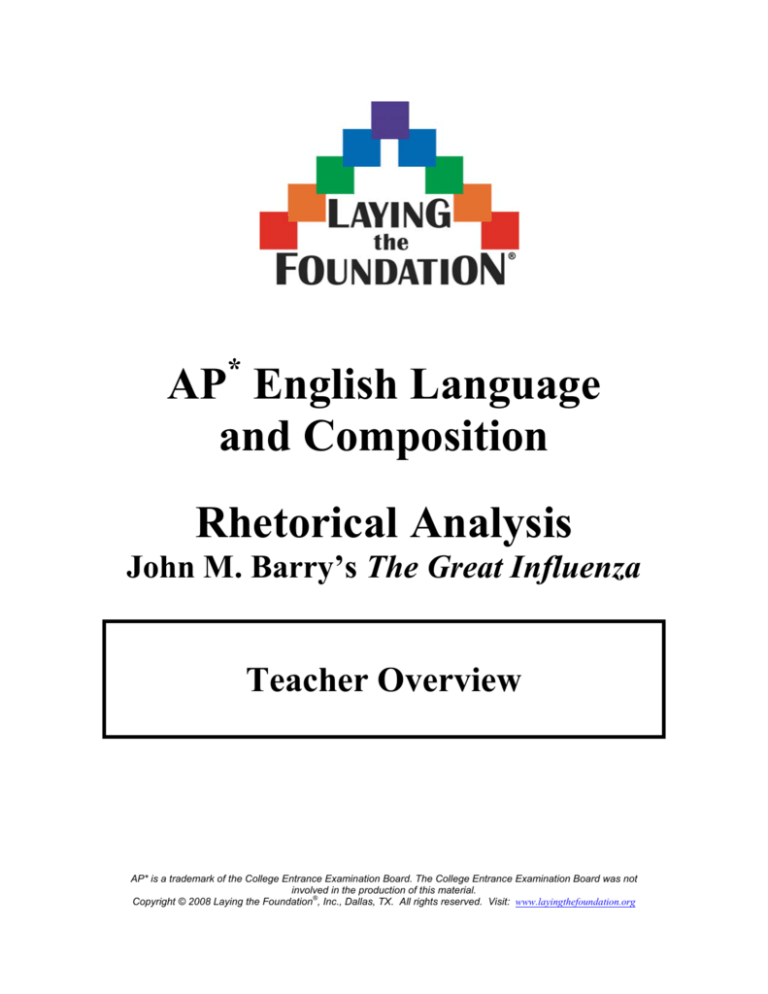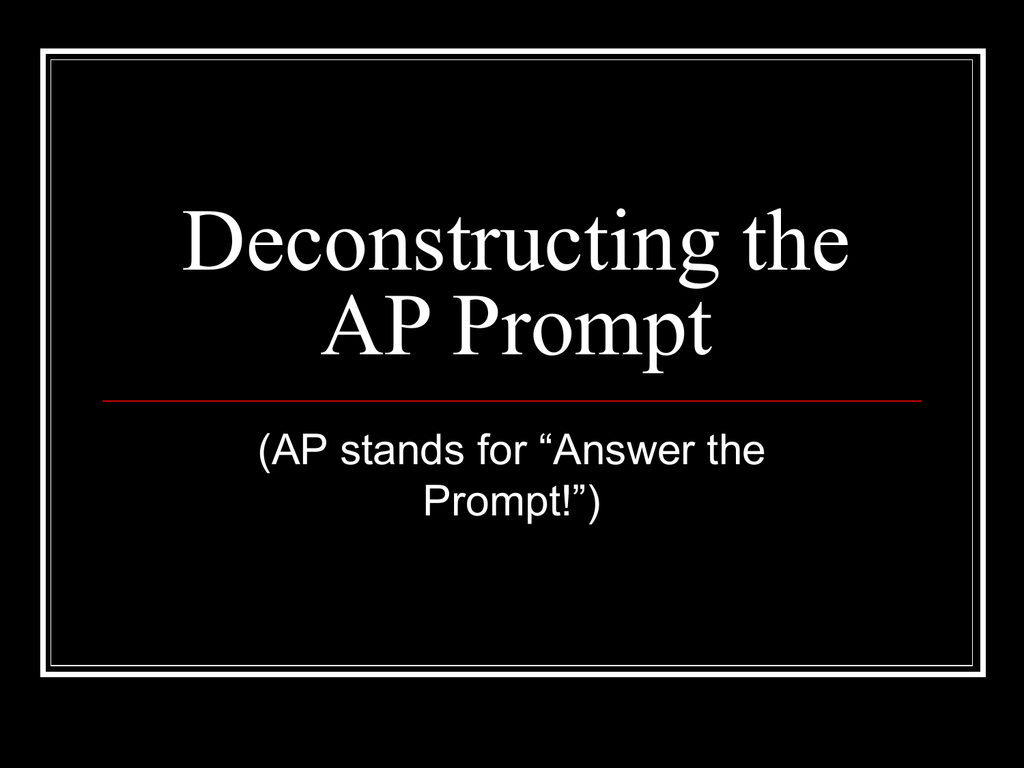
They are hero-like in their quality. John Barry says delves into the classification of scientist and their research in The Great Influenza, an account of the flu epidemic. Barry uses juxtaposition, metaphor, and rhetorical questions to characterize the nature scientific research and inquiry. In the first paragraph Barry juxtaposes certainty and uncertainty in both idea and · Rhetorical Analysis of John M Barry's The Great Influenza. In The Great Influenza Barry contrasts certainty and uncertainty so that there is an understanding that scientific research is in fact a pioneering effort through effective abstract language, romanticized syllogism, and strong metaphors. Firstly, the author points out the obvious knowledge Author John M. Barry, in The Great Influenza, claims that scientists must embrace uncertainty and doubt their ideas in order to be successful in their research. To support his claim, he first states that “uncertainty creates weakness”, then lists the traits required by scientists (including curiosity and creativity), and finally explains that experiments must be made to work by the
The Great Influenza Rhetorical Analysis - Words | Bartleby
Science is the study of the world around us. It is a field like no other because those in it have great courage, passion, and self-sufficiency. They are hero-like in their quality. John Barry says delves into the classification of scientist and their research in The Great Influenza, an account of the flu epidemic. Barry uses juxtaposition, metaphor, and rhetorical questions to characterize the nature scientific research and inquiry.
In the first the great influenza john m barry rhetorical analysis Barry juxtaposes certainty and uncertainty in both idea and structure. Barry says that certainty is opposite of uncertainty and therefore they have opposite effects.
In the second part of the paragraph Barry mimics the first in order to show that uncertainty is necessary in science, the great influenza john m barry rhetorical analysis. The fact that the sentence about uncertainty is short gives strength to what he calls weak. Overall, Barry is saying through his initial juxtaposition that science is uncertain but strong.
Starting in the fourth paragraph Barry begins an extended metaphor explaining how scientists are on the frontier. Disclaimer: This work has been submitted by a student. This is not an example of the work written by professional academic writers. Here you can order a professional work. Find a price that suits your requirements. Barry says that scientists though uncertain must brave the wilderness in order to discover what they seek. They are adventurers that must brave the wilderness in a disciplined way without the necessary tools.
Barry shows the true nature of science with the rhetorical questions within the metaphor. The questions show how scientists are careful and second guess themselves often in order to be sure they are correct. The great influenza john m barry rhetorical analysis, metaphor, and rhetorical questions are all used by John Barry in order to classify scientific research.
Barry says that scientific research is a heroic profession that requires many skills and the ability to contradict your own ideas, the great influenza john m barry rhetorical analysis.
Uncertainty is abundant in the field but must be overcome in order to discover what is needed. Ultimately, scientists are investigators, inventors, and explorers that in a heroic-like manner brave the uncertainty of the frontier in the quest of knowledge. List of Famous Biologists By Reference more List of the most notable and famous Biologists in the world, with photos when available.
Most prominent Biologists worldwide and top Biologists in America can be found on this list in alphabetical order. From reputable Biologists to the lesser known Biologists in history and today, these are the top Biologists in their field, and should answer the RESEARCH QUESTIONS The two research questions are: 1 How does the Science ALIVE!
elementary particle research. He is best the great influenza john m barry rhetorical analysis for his uncertainty principle, with other leading German scientists. Inhe returned professors to ask four questions on three subjects. distances such as the order of atoms and electrons. request that scientists answer the questions about the embryos species being human beings. Supporters of the stem cell research state stem Science and ethics: The intertwined debate on stem cells.
in sociological studies, although still, scientists will always question its relevance due to its is further defined as research that constitutes the art and science of describing a is a holistic approach, in order to achieve a complete and helping students. Other Scientist perform conducive reading research to understand disabilities. there is an intervention. In order for a student be beginning of the article. Research questions are concise, probing statements that include this population from the sample used for research.
In order to control the influence of the Home Essays Term Papers Dissertations Paper Writing Service. Similar Papers Research on Science Werner Heisenberg And The Heisenberg Uncertainty P Embryonic Stem Cell Research How Does It Affect You Lindsay Research Ethnography Community Quantitative Nursing Research Report Analysis All Papers Are For Research And Reference Purposes Only.
You must cite our web site as your source.
The Great Influenza (Audiobook) by John M. Barry
, time: 5:02John Barry The Great Influenza Rhetorical Analysis | blogger.com

The Great Influenza Rhetorical Analysis Essay Attention Getting Device: John Barry, in his writing, The Great Influenza, he states, “To be a scientist requires not only intelligence and curiosity, but passion, patience, creativity, self-sufficiency, and courage · Rhetorical Analysis of John M Barry's The Great Influenza In The Great Influenza Barry contrasts certainty and uncertainty so that there is an understanding that scientific research is in fact a pioneering effort through effective abstract language, romanticized syllogism, and strong metaphors John Barry says delves into the classification of scientist and their research in The Great Influenza, an account of the flu epidemic. Barry uses juxtaposition, metaphor, and rhetorical questions to characterize the nature scientific research and inquiry. In the first paragraph Barry juxtaposes certainty and uncertainty in both idea and Estimated Reading Time: 4 mins
No comments:
Post a Comment